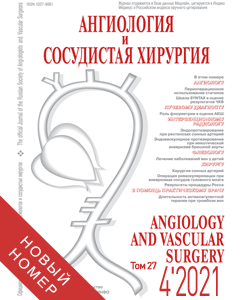Journal «Angiology and Vascular Surgery» •
2012 • VOLUME 18 • №1
Endovascular radiofrequency denervation of renal arteries as an innovation method of treatment of refractory arterial hypertension: first experience in Russia
Danilov N.M.1, Matchin Yu.G.2, Chazova I.E.1
1) Department of Systemic Hypertensions,
2) Laboratory of Roentgenoendovascular Methods of Outpatient Diagnosis and Treatment; Federal State Budgetary Facility «Russian Cardiological Scientific and Production Complex» under the Ministry of Public Health and Social Development of the Russian Federation, Moscow, Russia
Excessive activation of the sympathetic nervous system forms the basis of pathogenesis of essential arterial hypertension (AH). The present work was aimed at evaluating efficacy and safety of endovascular radiofrequency denervation of renal arteries in patients with AH refractory AH based on the initial first experience in with using this methodology in the Russian Federation.
The interventions were carried out on December 14-15th, 2011 in the first five patients presenting with AH refractory to antihypertensive therapy consisting of three and more drugs in therapeutic doses, one of which was a diuretic. The selection criteria were systolic arterial pressure (SAP) ≥160 mm Hg or ≥150 mm Hg in the presence of type 2 diabetes mellitus. The obligatory conditions for selection were the preserved renal function [glomerular filtration rate (GFR) ≥45 ml/min] and the absence of the secondary form of AH. The procedure of denervation was performed in the conditions of roentgen-operating room using special Medtronic Ardian Simplicity Catheter System™.
In all cases we managed to perform bilateral denervation of renal arteries with the radiofrequency effect in not less than 4 zones of each of vessels. Efficacy of each of the effect was registered with due regard for reaching certain temperature and values of impedance. The interventions were not accompanied by the development of any complications either in the area of manipulations or the site of puncture. Neither were there any complications from the side of the cardiovascular or excretory systems of the body. Diurnal monitoring of AP (DMAP) registered a significant decrease in SAP averagely from 174±12 to 145±10 mm Hg three days after the intervention. A persistent antihypertensive effect was confirmed by the DMAP findings one month after denerva- tion – the SAP level averagely amounted to 131±6 mm Hg.
Endovascular radiofrequency denervation of renal arteries is a safe and efficient method of treatment of AH resistant to multicomponent antihypertensive therapy.
KEY WORDS: renal denervation, sympathetic nervous system, treatment-resistant hypertension.
P. 54
ARCHIVES MAGAZINE
2021 (Vol.27)
2020 (Vol.26)
2019 (Vol.25)
2018 (Vol.24)
2017 (Vol.23)
2016 (Vol.22)
2015 (Vol.21)
2014 (Vol.20)
2013 (Vol.19)
2012 (Vol.18)
2011 (Vol.17)
2010 (Vol.16)
2009 (Vol.15)
2008 (Vol.14)
2007 (Vol.13)
2006 (Vol.12)
2005 (Vol.11)
2004 (Vol.10)
2001 (Vol.7)
2000 (Vol.6)
1999 (Vol.5)
1998 (Vol.4)
1997 (Vol.3)


